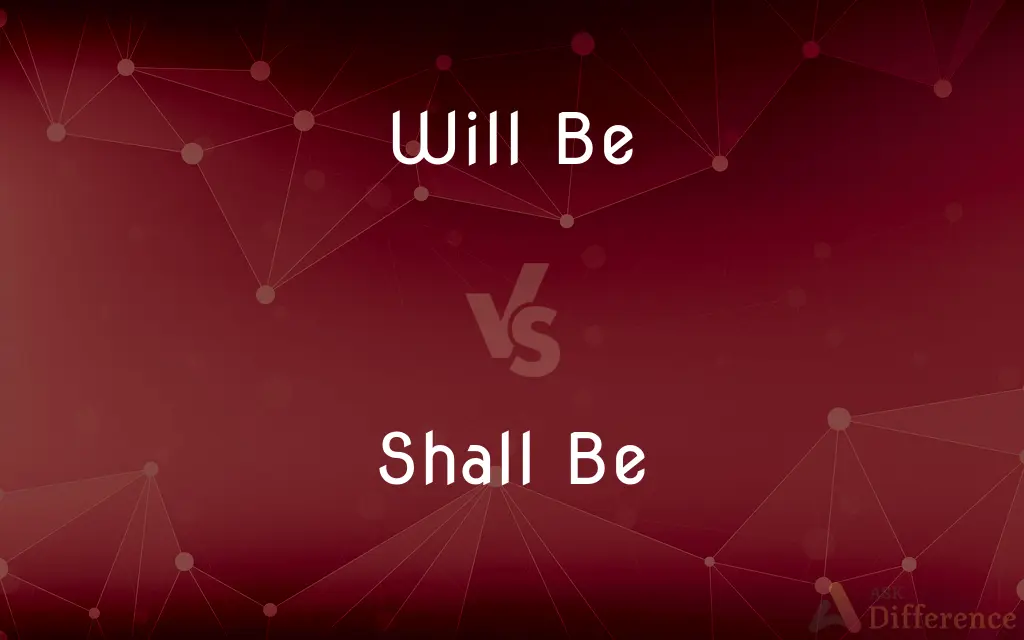Will Be vs. Shall Be — What's the Difference?
By Tayyaba Rehman — Published on October 7, 2023
"Will Be" typically indicates a future action or state, whereas "Shall Be" is a more formal, often obligatory future indication, now less common in everyday American English.

Difference Between Will Be and Shall Be
Table of Contents
ADVERTISEMENT
Key Differences
On the other hand, "Shall Be" carries a nuance of formality and sometimes suggests an obligation or determination. Historically, "shall" was used more broadly for the future tense, but in modern American English, it has a tone of formality or emphasis. A statement like "There shall be justice" doesn't just predict the future; it asserts a strong intention or mandate.
Tayyaba Rehman
Oct 07, 2023
Furthermore, "Will Be" has become the default way to indicate the future in informal contexts. If someone says, "We will be meeting at 5 PM," it's a straightforward future arrangement. Conversely, "We shall be meeting at 5 PM" sounds more formal, even a bit old-fashioned to American ears.
Tayyaba Rehman
Oct 07, 2023
The choice between "Will Be" and "Shall Be" often hinges on the level of formality or emphasis desired by the speaker. In legal or official documents, "shall" might be used to impose a duty or requirement. Meanwhile, "will" is the go-to choice for everyday, casual communications about the future.
Tayyaba Rehman
Oct 07, 2023
"Will Be" and "Shall Be" are both future tense constructions in English, but they possess subtle differences. "Will Be" is frequently used in American English to indicate future actions or states without any sense of obligation. For example, "The event will be tomorrow" simply states a future occurrence without imposing any necessity.
Tayyaba Rehman
Oct 07, 2023
Comparison Chart
Usage
Common in everyday American English
More formal, less common in everyday speech
Tayyaba Rehman
Oct 07, 2023
ADVERTISEMENT
Obligation
Typically lacks sense of obligation
Can suggest obligation or strong intent
Tayyaba Rehman
Oct 07, 2023
Historical Usage
Used for the future, especially in recent times
Traditionally a broader future tense indicator
Tayyaba Rehman
Oct 07, 2023
Contextual Application
Casual, general future statements
Legal, formal, or situations needing emphasis or determination
Tayyaba Rehman
Oct 07, 2023
Definitions
Will Be
Indicates a future action or state.
The conference will be held in June.
Tayyaba Rehman
Oct 04, 2023
ADVERTISEMENT
Shall Be
Can imply obligation or determination.
All members shall be present.
Tayyaba Rehman
Oct 04, 2023
Shall Be
More formal expression for future actions or states.
The proceedings shall be documented.
Tayyaba Rehman
Oct 04, 2023
Shall Be
Common in legal or official contexts.
There shall be no trespassing.
Tayyaba Rehman
Oct 04, 2023
Will Be
Default for most future expressions in American English.
I will be there to support you.
Tayyaba Rehman
Oct 04, 2023
Shall Be
Suggests a strong intent or assertion.
There shall be peace in the land.
Tayyaba Rehman
Oct 04, 2023
Shall Be
Traditionally used for the first person future tense.
I shall be leaving by morning.
Tayyaba Rehman
Oct 04, 2023
FAQs
When should I use "Will Be"?
"Will Be" is best for everyday, casual future references in American English.
Tayyaba Rehman
Oct 07, 2023
Is "Will Be" informal?
"Will Be" has a neutral tone and is standard in both informal and formal contexts.
Tayyaba Rehman
Oct 07, 2023
Does "Shall Be" express certainty?
It can express both future certainty and strong intent or determination.
Tayyaba Rehman
Oct 07, 2023
Is "Shall Be" still used today?
While less common in daily speech, "Shall Be" is still found in legal, literary, and certain formal contexts.
Tayyaba Rehman
Oct 07, 2023
Are they interchangeable?
While both indicate the future, they aren't always interchangeable due to differences in tone and implication.
Tayyaba Rehman
Oct 07, 2023
Can "Shall Be" imply obligation?
Yes, "Shall Be" can suggest obligation, especially in legal or official documents.
Tayyaba Rehman
Oct 07, 2023
Is "Shall Be" old-fashioned?
In American English, "Shall Be" can sound formal or old-fashioned, especially in casual contexts.
Tayyaba Rehman
Oct 07, 2023
Are "Will Be" and "Shall Be" treated differently in British English?
Yes, traditionally in British English, "shall" is used with the first person to indicate the future, while "will" is used with second and third persons. This distinction is less strict today.
Tayyaba Rehman
Oct 07, 2023
Was "shall" traditionally used differently?
Historically, "shall" was broader in scope, often indicating the simple future, especially for the first person.
Tayyaba Rehman
Oct 07, 2023
Do both "Will Be" and "Shall Be" have the same grammatical structure?
Both are auxiliary verbs followed by the base form of the verb "be", but they convey different nuances of meaning and formality.
Tayyaba Rehman
Oct 07, 2023
Can "Shall Be" be used to make commands or give instructions?
Yes, especially in formal or legal contexts. For instance, "Visitors shall be accompanied by a guide."
Tayyaba Rehman
Oct 07, 2023
Why is "Will Be" more prevalent in American English?
Over time, American English evolved to favor "Will Be" for its neutrality and simplicity for future references.
Tayyaba Rehman
Oct 07, 2023
How do I choose between the two?
use "Will Be" for most situations and "Shall Be" for formality or emphasis.
Tayyaba Rehman
Oct 07, 2023
Is "Will Be" always future-oriented?
Predominantly, yes. "Will Be" indicates a future action, state, or condition.
Tayyaba Rehman
Oct 07, 2023
What happens if I use "Shall Be" in everyday conversation?
It may sound formal or old-fashioned to American listeners, but the meaning will still be clear.
Tayyaba Rehman
Oct 07, 2023
Author Spotlight
Written by
Tayyaba RehmanTayyaba Rehman is a distinguished writer, currently serving as a primary contributor to askdifference.com. As a researcher in semantics and etymology, Tayyaba's passion for the complexity of languages and their distinctions has found a perfect home on the platform. Tayyaba delves into the intricacies of language, distinguishing between commonly confused words and phrases, thereby providing clarity for readers worldwide.

















































